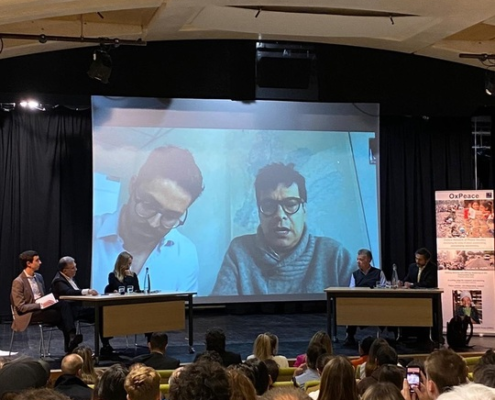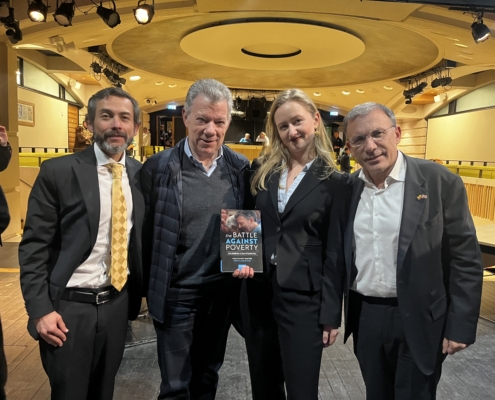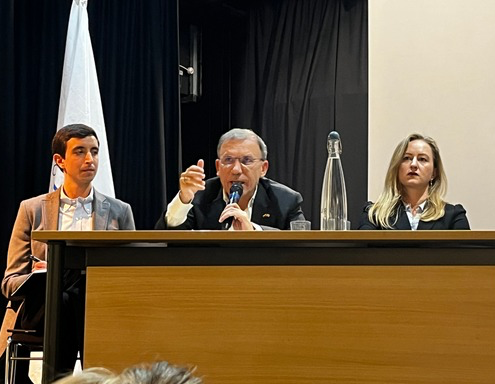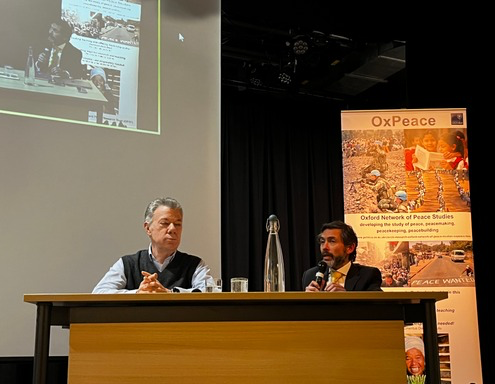TEN YEARS OF PEACE PROCESSES IN COLOMBIA
Policy Brief
27/11/2023
On November 1, 2023, former Colombian President and Nobel Peace Laureate, Juan Manuel Santos, HE Roy Barreras, Ambassador of Colombia to the United Kingdom, Danilo Rueda, Colombia’s High Commissioner for Peace, and Dr. Gwen Burnyeat, Junior Research Fellow at Merton College, Oxford, took part in a dialogue hosted at St John’s College, Oxford. This event, jointly organised by Anglo-Colombian peacebuilding organisation Rodeemos el Diálogo (ReD, Embrace Dialogue), the University of Winchester’s Centre of Religion, Reconciliation and Peace, and the Oxford Network of Peace Studies (OxPeace), provided a space for a first-hand discussion on Colombia’s strenuous journey towards lasting peace. Andrei Gómez-Suárez and Alejandro Posada Téllez summarise the key lessons learned for Colombia and beyond.
 This dialogue across the Petro and Santos administrations represents a momentous step in knowledge exchange, reflecting a decade’s worth of lessons learnt in peace processes. They show continuities and discontinuities between the administrations, and invite reflection on the significant interconnections between past and present initiatives for peace. The insights have the potential to inspire and inform improved practices in Colombia’s ongoing pursuit of peace and to offer valuable pointers for governments and peacebuilders in conflict-affected regions worldwide.
This dialogue across the Petro and Santos administrations represents a momentous step in knowledge exchange, reflecting a decade’s worth of lessons learnt in peace processes. They show continuities and discontinuities between the administrations, and invite reflection on the significant interconnections between past and present initiatives for peace. The insights have the potential to inspire and inform improved practices in Colombia’s ongoing pursuit of peace and to offer valuable pointers for governments and peacebuilders in conflict-affected regions worldwide.
A Decade of Peacebuilding in Colombia
Colombia has grappled with half a century of protracted armed conflict. The 2016 Peace Agreement, negotiated between President Santos and the Revolutionary Armed Forces of Colombia (FARC), marked a pivotal moment in the nation’s quest for peace. The agreement was the result of six years of negotiations, which formally started in 2012.
The agreement includes an agrarian reform; provisions to strengthen political participation; a comprehensive solution to illicit drugs; the satisfaction of victims’ rights and full respect of international human rights; the end of the conflict with the FARC; security guarantees for former combatants and activists; and cross-cutting gender and ethnic dispositions.
Implementation of the agreement did not start in full swing due to political opposition. However, it made substantial progress until 2018, when Iván Duque, a staunch critic of the peace agreement, was elected president. Then followed a serious decline in the pace of implementation and open opposition from government to the autonomous institutions created by the peace agreement, such as the Special Jurisdiction for Peace (JEP). The frustration of a large sector of society with the lack of implementation contributed to the election in 2022 of Gustavo Petro, the first ever leftist president of Colombia.
Since taking power in August 2022, the Petro administration has put forward an ambitious peace policy, known as ‘Total Peace’, to bring all forms of organised violence in Colombia to an end. As some panellists discussed in this event, at the heart of Petro’s peace agenda is the 2016 Peace Agreement, which has prompted the government to pay special attention to three elements of the agreement. First, to deliver on the agrarian reform by giving land back to peasant farmers, ethnic groups, and conflict victims, while pushing Congress to create an Agrarian Jurisdiction with the constitutional ability to resolve land disputes.
Second, to guarantee the security of former FARC combatants and community leaders by reactivating the National Commission of Security Guarantees. Third, to fulfil victims’ rights by committing to support full implementation of the recommendations included in the final report of the Truth Commission.
An additional key pillar of “Total Peace” is the quest to dismantle all remaining illegal armed groups, which was an important commitment of the 2016 Peace Agreement. To this end, the Office of the High Commissioner for Peace under the Petro administration resumed negotiations with the National Liberation Army (ELN), taking the progress made under the Santos administration as a starting point, and created a legal framework to explore political and socio-juridical negotiations with other illegal armed groups. So far, there are ongoing dialogues with the Estado Mayor Central (EMC), a dissident group of the FARC, and three urban dialogues in the cities of Buenaventura, Quibdó and Medellín. According to the Petro administration, any agreements reached during these will build upon the 2016 Peace Agreement and will abide by the standards of international law.
Lessons for Solid and Comprehensive Peace Agreements
Three main lessons emerged from the event for strengthening the procedures and outcomes of peace negotiations:
- The idea of ‘carrots and sticks’ highlights the intricate nature of peace negotiations. In peace talks, negotiators often extend incentives, or ‘carrots’, to encourage armed groups to lay down their weapons. Simultaneously, there is a need for credible deterrence, or ‘sticks’, to ensure compliance with the terms of the agreement. Striking a harmonious balance between these elements is paramount to the success of peace negotiations.

- Truth-seeking and victim-centred provisions within peace processes are fundamental. Recognising the suffering of victims and acknowledging the deep wounds inflicted by the conflict on individuals and communities are pivotal components for sustainable reconciliation and peace. Comprehensive attention to these issues is central to processes of healing and restoration of the social fabric in post-conflict societies, and must be integrated into negotiation processes from the very beginning.
- Flexibility is a key aspect of peace negotiations, allowing for adaptation to ever-evolving conflict dynamics. In a constantly changing socio-political landscape, an adaptive pace-making methodology proves as vital as the substance of the agreements themselves. This adaptability ensures that new challenges and realities on the ground can be effectively addressed.
Lessons for Ensuring Implementation of Peace Agreements
The dialogue suggested that four factors that can contribute to the effective implementation of peace agreements:
- Peace agreements must be integrated into a nation’s legal framework. This legal binding elevates peace from a mere political promise to a binding commitment of the state enforceable under the law.
- International support is vital, including that of the United Nations Security Council, to nurture trust between the parties and hold them accountable for implementation of agreements. Respectful international involvement introduces layers of security and commitment, reinforcing the stability of the peace process.
- The legitimacy and political will of a government pave the way for more effective implementation of agreements. This highlights the deeply political nature of peacebuilding processes and the need to overcome the dogma of liberalism that conceives of transitions from war to peace as technical and apolitical.

- With information overloads producing fertile ground for disinformation, the creation of pedagogy teams to effectively communicate the progress of negotiations and the implementation of peace agreements to national and international audiences is critical. This can help address concerns such as the lack of trust in governments, and political polarisation. This may in turn enhance the support of civil society for the long-term process of building peace.
Lessons for the Future of Peacebuilding in Colombia and Beyond
The past decade of peace processes in Colombia should be seen as a continuous, multi-generational effort that transcends political administrations. To consolidate the commitment of the state, there must be an ongoing, open dialogue among all stakeholders, ensuring that the lessons learned from previous processes are carried forward and inform the strategies of future administrations. This will help to bridge gaps in understanding, build trust, and foster a sense of a national unity – albeit agonistic – around the path to peace.
These lessons have far-reaching implications, serving as indicators for those striving to construct and uphold peace in Colombia and beyond. Colombia’s journey towards sustainable peace exemplifies the need for comprehensive, adaptable, and inclusive strategies to address the multifaceted challenges of societies transitioning from war to peace.
| Disclaimer – The analysis contained herein only reflects the views of the authors, and does not necessarily reflect the views of the participants or of the convening organisations. |
ABOUT THE AUTHORS
Andrei Gómez-Suárez, senior research fellow at the Centre of Religion, Reconciliation and Peace, University of Winchester, and Alejandro Posada-Téllez, DPhil Candidate at the University of Oxford. Both are members of Embrace Dialogue and the OxPeace steering committee.




